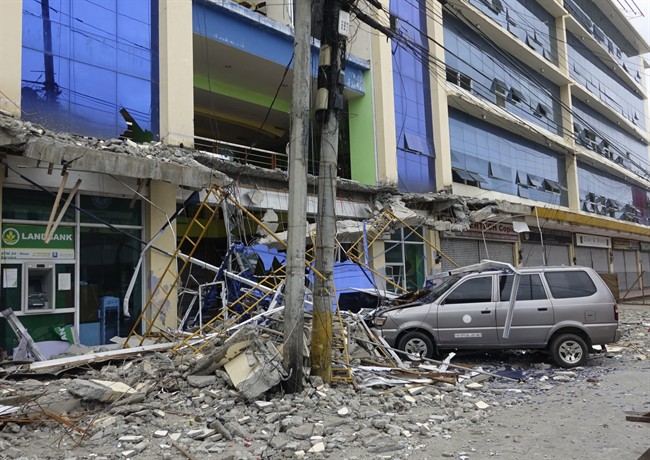Last year was a roller coaster; world governments were shaken by events like Brexit and Donald Trump’s surprise presidential win, populations changed as the refugee crisis continued and terror attacks in Europe and the U.S. had people on edge.

But 2017 may not be a walk in the park either, according to the World Economic Forum’s annual global risk report, which surveys the top 10 risks facing our world.
READ MORE: Donald Trump, terrorism and Brexit: 10 big stories that shook the world in 2016
According to the survey, released in January, extreme weather events ranked as the top risk in terms of likelihood and second in terms of the impact extreme weather will pose. Natural disasters ranked third on the list of the most likely risks, with man-made environmental disasters ranking eighth.
However, these natural events pose a greater risk in terms of impact, according to the World Economic Forum. While extreme weather events ranked second in terms of impact, water and food crises, as well as the failure of climate-change adaptation also made the list of the top 10 risks in terms of impact. Over 750 experts assessed 30 global risks and underlying trends that could amplify as a result of those risks in order to create the list.
These risks are not new – weather related events have ranked high on the risk scale for the past seven global risk reports – and have already made an impact this year.
Last month, 29 people were killed after an avalanche buried a hotel in central Italy. The avalanche came after record amounts of snow within the region, as well as several strong earthquakes throughout the country.
Terrorist attacks ranked fourth on the list of most likely threats, but ranked eight in terms of impact.
READ MORE: Muslim misconceptions: The everyday Islamophobia facing Canadians
But terrorism remains a big topic of conversation, due to the political landscape in the United States under President Donald Trump‘s new administration. The beginning of the year was marked by news of Trump’s controversial travel ban, which temporarily prevented those with passports from Iran, Iraq, Libya, Somalia, Sudan, Syria and Yemen from entering the U.S.
Despite accusations the so-called travel ban targeted Muslims, Trump insisted the executive order was created to help further “extreme vetting” measures in the country.
READ MORE: Trump calls it a travel ban, White House says it’s not a ban. So what is Trump’s immigration order?
Trump has repeatedly warned of the threats posed by “radical Islamic terrorism.”
- ‘Shock and disbelief’ after Manitoba school trustee’s Indigenous comments
- Canadian man dies during Texas Ironman event. His widow wants answers as to why
- Several baby products have been recalled by Health Canada. Here’s the list
- ‘Sciatica was gone’: hospital performs robot-assisted spinal surgery in Canadian first
Technology threats, such as data fraud and theft and cyberattacks, also made the list of likely threats.
While cyberattacks against governments have been a large topic of conversation, particularly surrounding elections, experts agree the average Canadian has a high chance of being affected by technological threats.
In late 2016, popular domain name server (DNS) provider Dyn was targeted with a large-scale distributed denial of service (DDoS) attack that knocked its systems offline and caused widespread outages for websites like Twitter, Netflix, Amazon, Spotify and Airbnb. The attack was a rude awakening for consumers, after it was revealed that hackers orchestrated the takedown using malware to infect “smart” devices connected to the so-called Internet of Things.
READ MORE: From your smart TV being held hostage to personalized healthcare: What to expect from tech in 2017
Cybersecurity experts told Global News at the time that attacks like these are expected to ramp up over the next year, because it’s easy money for criminals.
“The bad guys realized it’s easier to enslave these devices, rather than a computer that has anti-virus software,” explained David Masson, Canada country manager for cyber security firm Darktrace. “Imagine you come home and your TV is hacked and you want to watch the game. Would you pay 50 bucks to unlock it?”





Comments